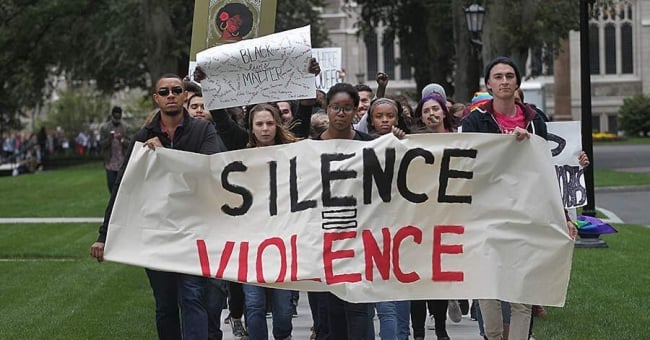You have /5 articles left.
Sign up for a free account or log in.

Boston College students protested the university's nonresponse to anti-LGBTQ vandalism in 2016.
Suzanne Kreiter/The Boston Globe/Getty Images
Students at Boston College are growing increasingly concerned that the institution's administrators are attempting to suppress their calls for the removal of university president Reverend William Leahy, after a student organization was threatened this week with revocation of their official status if members did not reschedule an off-campus protest.
The protest, originally scheduled for May 3, was intended to decry the “repeated silencing of student voices on campus” by the college's administrators, said Kyle Rosenthal, a senior and member of Climate Justice at Boston College, a climate activism group on campus that organized the demonstration. The students planned to meet at Boyden Park, which is not university property but is near the campus and a popular spot for student groups to hold events, Rosenthal said.
The group did not register the event with the university as required because of the immediate nature of the issues they planned to address at the protest rally and concerns about it being delayed by the official approval process.
The protest was planned to bring attention to a number of problems at the private, Jesuit university, including administrators’ response to recent reports of vandalism on campus targeting students of color and LGBTQ students, the Climate Justice group’s ongoing push for the university’s complete divestment from fossil fuels and allegations that Leahy mishandled complaints about inappropriate behavior by a priest who worked at the university nearly 23 years ago.
The allegations sparked ongoing calls for Leahy to resign. A petition signed by about 560 students, parents and faculty members demanding his removal as president says that students have lately "felt betrayed by Fr. Leahy and Boston College on a number of issues." Climate Justice, which called for Leahy to leave the institution and circulated the petition, intended to amplify that demand at the demonstration.
However, about three hours before the protest was scheduled to begin, executive board members of Climate Justice received an email from Tom Mogan, associate vice president for student engagement and formation, saying students had to register the event with the university’s Office of Student Involvement. Additionally, students were told at the beginning of the semester that the office would not be approving off-campus events, “given the public health situation and need to ensure health and safety protocols are followed,” Mogan wrote, referring to the coronavirus pandemic.
Mogan warned that Climate Justice could lose its status as an official student organization if the demonstration was not in compliance with university policies. Rosenthal said the group quickly decided to call off the demonstration for fear of being sanctioned for violating “vague” university policies related to COVID-19, despite plans to ensure attendees wear masks and remain six feet apart. The most recent COVID-19 order for the commonwealth of Massachusetts allows for up to 150 people to gather outside in public settings.
“Although completely unjustified, the threat of Boston College using some technicality, especially related to COVID rules, to discipline students was not worth it,” said James Mazareas, a 2003 alumnus who is a member of Climate Justice. (This paragraph has been updated to reflect Mazareas' current status at the college.)
“It’s really frustrating because they pay lip service to the idea they care about free speech and student voices,” Mazareas said. But “it’s an incredibly restrictive environment for student activists participating in free speech.”
The students allege that off-campus events by other student organizations held earlier this year have not faced similar issues, which Mogan denies. They believe administrators are enforcing the policies in an “arbitrary” and group-specific way to stifle student dissent.
Mogan denied this was the case. The Office of Student Engagement sent an email to all student organization leaders in January that “clearly indicated that no off-campus activities will be approved,” Mogan wrote in an email to Inside Higher Ed.
“No off-campus events for student organizations have been approved this academic year,” he wrote. “The specific prohibition on off-campus events was new this year. In any given year, student organizations need to register their event through our online system (whether on-campus or off-campus) to receive approval and that was not done in this case.”
Mogan added that he worked with Climate Justice to reschedule the protest, which is now scheduled to take place on campus today.
The students were dissatisfied with this compromise -- classes ended Thursday, and there will not be as many students on campus, Mazareas said. Holding the event on campus comes with separate restrictions, including a ban on attendees who are not affiliated with Boston College, which means local media cannot attend, he said. The protest has also lost its timeliness, as the allegations against Leahy were making headlines more than a week ago, Mazareas said.
“Just a week ago, there was so much buzz and energy around that story,” he said. But now students are distracted preparing for final exams and summer break, and the momentum created by the petition last week has died down, he said.
Rosenthal said coronavirus policies added to the 2020-21 student code of conduct and the Eagles Care Pledge, a document students were asked to sign before the fall 2020 semester that details public health and safety requirements to reduce the spread of COVID-19, have given administrators additional ways to restrict student dissent. The policy on demonstrations that was in place before the pandemic is already restrictive, he said.
The original demonstration policy detailed in the code of conduct requires student organizations to discuss plans for demonstrations with Mogan in advance and prohibits them from scheduling events within less than two days of that meeting. Student protesters cannot use amplified sound, such as megaphones, near academic or administrative buildings until after 5 p.m., and “Boston College reserves the right to condition the time, place, and manner of proposed demonstrations,” the policy says.
Adam Steinbaugh, an attorney and director of the individual rights defense program for the Foundation for Individual Rights in Education, or FIRE, a civil liberties watchdog group that defends the rights of students, said he understands the challenges college leaders are facing to balance students’ free speech and assembly rights with regulations to address the spread of COVID-19. But Steinbaugh questioned the purpose of Boston College’s limits on approved off-campus events and said “the students raise a good point.”
“Policies enacted in order to protect students and the community as a result of the pandemic need to focus on the public health concerns and need to be rational,” he said. “It’s hard to see what the purpose is of saying, ‘You can protest within the walls of the university, and you can’t protest outside of them.’”
Steinbaugh also noted that the university’s restrictive demonstration policy “can limit the ability of students to hold spontaneous protest and demonstrations.”
Rosenthal said the policies prevent student activists from immediately responding to controversies on campus and also create a scenario in which protesters are asking for permission to protest from the officials they are protesting. The requirement “doesn’t make sense” and “diminishes the impact” of demonstrations, he said.
“In my four years, we’ve had events and demonstrations on campus that are denied or delayed,” he said. “The allegations against our president are immediate in nature and need to be addressed.”




